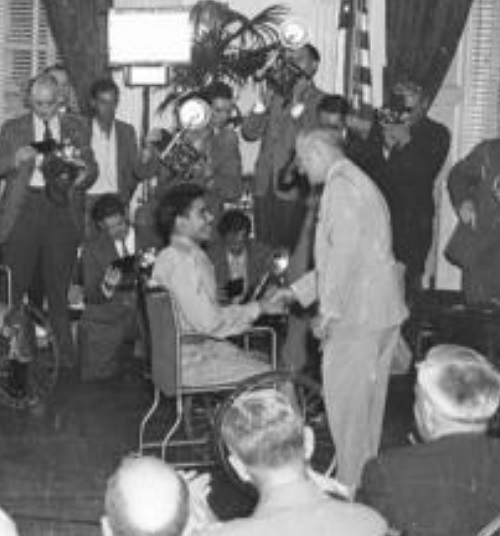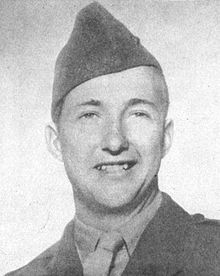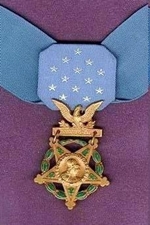 Medal of Honor Citation: Christian Albert
Medal of Honor Citation: Christian Albert
Rank: Private
Organization: U.S. Army
Company: Company G
Division: 47th Ohio Infantry
Born: Cincinnati, Ohio
Departed: Yes
Date of Issue: 08/10/1895
Place / Date: At Vicksburg, Miss., 22 May 1863
Citation: Gallantry in the charge of the “volunteer storming party.”
Category: Medal of Honor Citations
Medal of Honor Citations
 Medal of Honor Citation: Frederick Alber
Medal of Honor Citation: Frederick Alber
Rank: Private
Organization: U.S. Army
Company: Company A
Division: 17th Michigan Infantry
Born: 1838, Germany
Departed: Yes
Entered Service At: Manchester, Mich.
Date of Issue: 07/30/1896
Place / Date: At Spotsylvania, Va., 12 May 1864
Citation: Bravely rescued Lt. Charles H. Todd of his regiment who had been captured by a party of Confederates by shooting down one, knocking over another with the butt of his musket, and taking them both prisoners.
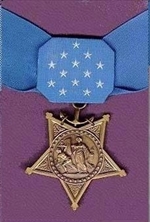 Medal of Honor Citation: Michael Aheam
Medal of Honor Citation: Michael Aheam
Rank: Paymaster’s Steward
Organization: U.S. Navy
Departed: Yes
Entered Service At: France
G.O. Number: 45
Place / Date: Cherbourg, France, 19 June 1864
Citation: Served on board the U.S.S. Kearsarge when she destroyed the Alabama off Cherbourg, France, 19 June 1864. Carrying out his duties courageously, PmS. Aheam exhibited marked coolness and good conduct and was highly recommended by his divisional officer for gallantry under enemy fire.
 Medal of Honor Citation: John G. B. Adams
Medal of Honor Citation: John G. B. Adams
Rank: Second Lieutenant
Organization: U.S. Army
Company: Company I
Division: 19th Massachusetts Infantry
Born: Groveland, Mass.
Departed: Yes
Date of Issue: 12/16/1896
Place / Date: At Fredericksburg, Va., 13 December 1862
Citation: Seized the 2 colors from the hands of a corporal and a lieutenant as they fell mortally wounded, and with a color in each hand advanced across the field to a point where the regiment was reformed on those colors.
 Medal of Honor Citation: Henry G. Bonebrake
Medal of Honor Citation: Henry G. Bonebrake
Rank: Lieutenant
Company: Company G
Born: Waynesboro, Pa.
Place / Date: At Five Forks, Va., 1 April 1865
Organization: U.S. Army
Division: 17th Pennsylvania Cavalry.
Departed: Yes
Citation: As 1 of the first of Devin’s Division to enter the works, he fought in a hand-to-hand struggle with a Confederate to capture his flag by superior physical strength.
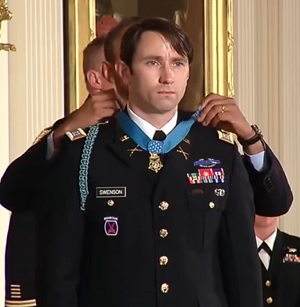
In October President Obama awarded William Swenson, a former active duty Army Captain, the Medal of Honor for conspicuous gallantry. Captain Swenson received the Medal of Honor for his courageous actions while serving as an Embedded Trainer and Mentor of the Afghan National Security Forces with Afghan Border Police Mentor Team, 1st Battalion, 32nd Infantry Regiment, 3rd Brigade Combat Team, 10th Mountain Division, during combat operations in Kunar Province, Afghanistan on September 8, 2009.
 Medal of Honor Citation: Alexander Bonnyman, Jr.
Medal of Honor Citation: Alexander Bonnyman, Jr.
Rank and organization: First Lieutenant, U.S. Marine Corps Reserves.
Born: 2 May 1910, Atlanta, Ga.
Accredited to: New Mexico.
Citation: For conspicuous gallantry and intrepidity at the risk of his life above and beyond the call of duty as Executive Officer of the 2d Battalion Shore Party, 8th Marines, 2d Marine Division, during the assault against enemy Japanese-held Tarawa in the Gilbert Islands, 20-22 November 1943. Acting on his own initiative when assault troops were pinned down at the far end of Betio Pier by the overwhelming fire of Japanese shore batteries, 1st Lt. Bonnyman repeatedly defied the blasting fury of the enemy bombardment to organize and lead the besieged men over the long, open pier to the beach and then, voluntarily obtaining flame throwers and demolitions, organized his pioneer shore party into assault demolitionists and directed the blowing of several hostile installations before the close of D-day. Determined to effect an opening in the enemy’s strongly organized defense line the following day, he voluntarily crawled approximately 40 yards forward of our lines and placed demolitions in the entrance of a large Japanese emplacement as the initial move in his planned attack against the heavily garrisoned, bombproof installation which was stubbornly resisting despite the destruction early in the action of a large number of Japanese who had been inflicting heavy casualties on our forces and holding up our advance. Withdrawing only to replenish his ammunition, he led his men in a renewed assault, fearlessly exposing himself to the merciless slash of hostile fire as he stormed the formidable bastion, directed the placement of demolition charges in both entrances and seized the top of the bombproof position, flushing more than 100 of the enemy who were instantly cut down, and effecting the annihilation of approximately 150 troops inside the emplacement. Assailed by additional Japanese after he had gained his objective, he made a heroic stand on the edge of the structure, defending his strategic position with indomitable determination in the face of the desperate charge and killing 3 of the enemy before he fell, mortally wounded. By his dauntless fighting spirit, unrelenting aggressiveness and forceful leadership throughout 3 days of unremitting, violent battle, 1st Lt. Bonnyman had inspired his men to heroic effort, enabling them to beat off the counterattack and break the back of hostile resistance in that sector for an immediate gain of 400 yards with no further casualties to our forces in this zone. He gallantly gave his life for his country.
Medal of Honor Citation: Richard I. Bong (Air Mission)
Rank and organization: Major, U.S. Army Air Corps.
Place and date: Over Borneo and Leyte, 10 October to 15 November 1944.
Entered service at: Poplar, Wis.
Birth: Poplar, Wis.
G.O. No.: 90, 8 December 1944.
Citation: For conspicuous gallantry and intrepidity in action above and beyond the call of duty in the Southwest Pacific area from 10 October to 15 November 1944. Though assigned to duty as gunnery instructor and neither required nor expected to perform combat duty, Maj. Bong voluntarily and at his own urgent request engaged in repeated combat missions, including unusually hazardous sorties over Balikpapan, Borneo, and in the Leyte area of the Philippines. His aggressiveness and daring resulted in his shooting down 8 enemy airplanes during this period.
 Medal of Honor Citation: Cecil H. Bolton
Medal of Honor Citation: Cecil H. Bolton
Rank and organization: First Lieutenant, U.S. Army, Company E, 413th Infantry, 104th Infantry Division.
Place and date: Mark River, Holland, 2 November 1944.
Entered service at: Huntsville, Ala.
Birth: Crawfordsville, Fla.
G.O. No.: 74, 1 September 1945.
Citation: As leader of the weapons platoon of Company E, 413th Infantry, on the night of 2 November 1944, he fought gallantly in a pitched battle which followed the crossing of the Mark River in Holland. When 2 machineguns pinned down his company, he tried to eliminate, with mortar fire, their grazing fire which was inflicting serious casualties and preventing the company’s advance from an area rocked by artillery shelling. In the moonlight it was impossible for him to locate accurately the enemy’s camouflaged positions; but he continued to direct fire 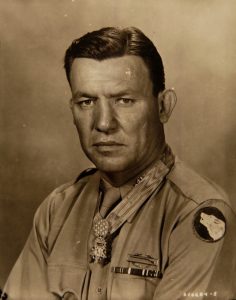
LINK: Cecil H. Bolton Biography
